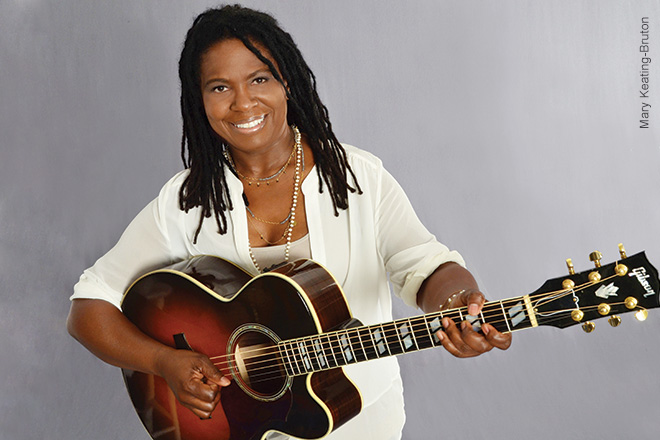RUTHIE FOSTER
On her latest set, the blues virtuosa has a lot to say—in her own voice
It’s midnight in Vienna on the eve of Ruthie Foster’s European tour with blues guitarist Eric Bibb. The blues-folk singer ought to be jet-lagged after a transatlantic flight earlier that day, but she’s yet to feel it. “I’m actually OK,” she says. “Feeling pretty good.”
She has good reason to feel cheery. Foster’s last three albums—2009’s The Truth According to Ruthie Foster, 2012’s Let It Burn, and her recently released Promise of a Brand New Day—garnered Grammy nominations for Best Blues Album. She also landed three consecutive Blues Foundation Blues Music Awards from 2010 through 2012, an Austin Music Award in 2013, and a Koko Taylor Award that same year.
Foster’s on a roll—yet she keeps perspective on the accolades. “It’s great to be recognized,” says Foster, 50, “but my real goal is to work hard and bring my best to my audiences.” She brings her best on Promise of a Brand New Day. “I wrote a lot more for this record,” she says. “I wanted to go deeper into the blues and genuine soul. Meshell was all about that.”
Foster’s referring to noted bassist Meshell Ndegeocello, who produced and played on the record as well as assembled the musicians, including guitarist Doyle Bramhall II and singer Toshi Reagon. The project found both women exploring new stylistic terrain. “She works in a totally different genre than anything I do,” Foster says. “But the blues is in her blood as much as it is in mine. She asked me where I wanted to go with this record, and I told her I wanted to say something meaningful. And she helped me with that.”
Foster’s determination to make a social statement is evident on the record. “I hadn’t done much of that before, but I knew it was time,” she says. “I wanted to express things in my own voice. ‘It Might Not Be Right,’ the song I wrote with William Bell, addresses gay marriage, and ‘Second Coming’ brings a specific message about civil rights.
“Meshell was great about pushing me to write about who I am—as a black woman, a woman who’s involved with another woman, a woman who has a child, and a musician who spends a lot of time on the road. This album hit on a lot of themes that deal with real life.”
Born and raised in Gause, Texas, Foster descended from a long line of gospel singers, a legacy that continues to inform her music. “They were Missionary Baptists,” she reflects. “That’s where I gained my first musical awareness. I experienced a very strict view of gospel while growing up, going back to my pre-teen years when I travelled from church to church in central Texas as a guest vocalist. Surprisingly, the church congregation I grew up with was very forgiving when it came to what I wanted to do.
“My grandmother, a church matriarch, supported me when I wanted to sing contemporary gospel, and play guitar and piano. My mother was also very supportive. She knew I would always remember my roots. And I do. I respect where I came from, and it’s all a part of my makeup. It all started there.”
The life lessons still resonate. “It gets to a point where you are who you are, and you get busy with living and not worrying about what others think,” she says. It’s hard to do that in the world we’re living in right now. I’ve spent so much time in front of people, not necessarily hiding who I am, but just trying to develop my career.
“But I’m at a point now where I can say, ‘This is my life—and while it’s not all that I am, it is what I do.’”
–Lee Zimmerman




comment closed